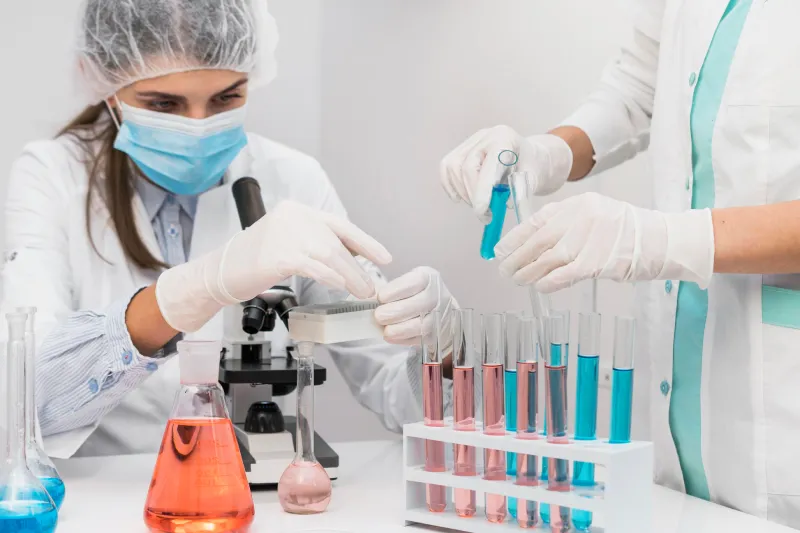

In this article
ToggleHave you always aspired to a career in medicine and science? Well, qualifying for NEET is not the only way to enter this field. If you think that the branch of science dealing with the diagnosis, treatment and prevention of diseases using various laboratory tests are the areas of your interest, then you can have the best career after BSc MLT.
According to BLS, the employment of clinical laboratory technicians and technologists is expected to grow 7% from 2021 to 2031, which is about as fast as the average for all occupations. On average, about 25,600 openings for clinical laboratory technologists and technicians are projected each year over the decade.
Therefore, if you wish to unlock your potential in the field of medical diagnostics and research, learn how the BSc MLT course can prepare you for an ever-evolving and successful career.
BSc MLT stands for Bachelor of Science in Medical Laboratory Technology. It is an undergraduate degree programme that focuses on the study of medical laboratory sciences. MLT professionals, also known as medical laboratory technologists or medical laboratory scientists, play a crucial role in diagnosing, monitoring and treating diseases by performing various laboratory tests and analyses.
The BSc MLT programme typically covers a wide range of subjects, including clinical biochemistry, haematology, microbiology, immunology, pathology, molecular diagnostics, blood banking and laboratory management. Students gain theoretical knowledge as well as practical skills in laboratory techniques, equipment operation, quality control and data analysis.
Well, when it comes to deciding on a career after BSc MLT, there are varieties of doors open for you. Jobs after BSc Medical Laboratory Technology are very promising. Both government and non-government job opportunities are open once you complete your BSc MLT. Let us learn about them in detail.
A Bachelor of Science (BSc) in Medical Technology offers a wide range of career opportunities in the healthcare industry. Medical technologists, also known as clinical laboratory scientists, play a crucial role in diagnosing, treating and preventing diseases by performing various laboratory tests and analyses. Here are some of the key scopes and career paths for individuals with a BSc in Medical Technology:
The BSc in Medical Technology scope is diverse and the demand for skilled medical technologists continues to grow. Continuous learning, specialisation and staying updated with advancements in medical technology can enhance career prospects and provide opportunities for advancement within the healthcare industry.
There are several government jobs after BSc MLT that you can explore. Here are some government job titles that are relevant to the field of MLT:
These are just a few examples of government job titles you can pursue after completing your BSc in MLT. However, if you think you have the time to study more or move forward with further studies, you again have several options.
There is always a scope to learn and enhance your knowledge. The same is the case with BSc MLT. Candidates willing to go for higher studies after BSc MLT can surely opt for it. Here are a few possibilities:
Remember to research the specific requirements and prerequisites for the programmes or certifications you are interested in, as they may vary depending on the institution and country. Additionally, networking, internships and gaining practical experience alongside your studies can significantly enhance your career prospects.
The B.Sc. in MLT salary can vary depending on several factors, including the work experience, job position and the specific industry they work in. It usually ranges between INR 5 lakhs to INR 8 lakhs.
The Apollo University, one of the best BSc Medical Lab Technology colleges, equips you with the necessary theoretical foundation and hands-on training to excel in various job roles. Whether you choose to work in clinical laboratories, research institutions or government health departments, you’ll have the skills to perform laboratory tests, analyse samples and contribute to accurate diagnostics.
Let us first go through the main objective of the programme at the university.
How Does B.Sc. Medical Laboratory Technology Programme @ Apollo University Shape Your Healthcare Career?
With the following objectives, B.Sc. Medical Laboratory Technology programme at The Apollo University makes students efficient enough to shape their careers well after the completion of the course. The programme:
The BSc Medical laboratory technology placements provided by The Apollo University further enhance your career prospects, allowing you to gain valuable real-world experience in clinical settings, research institutions and industry. These placements provide a platform to apply your knowledge, develop technical expertise and build professional networks. The placement rate at The Apollo University usually ranges from 80% to 90%.
So, pursuing a career after completing a BSc in Medical Laboratory Technology (MLT) at The Apollo University can lead to a range of exciting opportunities in the field of medical diagnostics and research. With the knowledge and practical skills acquired during your studies, you can embark on a fulfilling career path in healthcare.
An undergraduate programme that trains you in medical laboratory sciences to support diagnosis, monitoring and treatment through lab tests and analyses.
Typically, no. Admissions are usually merit- or entrance-based by the university/college, not via NEET (check specific institute criteria).
Some subjects covered in the course are clinical biochemistry, hematology, microbiology, immunology, pathology, molecular diagnostics, blood banking and lab management with extensive practical exposure.
Some jobs you can get after completing the course are Medical technologist, clinical laboratory scientist, blood bank technologist, infection-control specialist, quality control officer, research assistant and healthcare consultant.
Yes. Roles like Government Medical Laboratory Technologist/Technician, Public Health Lab Technician, Medical Laboratory Scientist, Quality Control Officer and Public Health Inspector are available for graduates.
